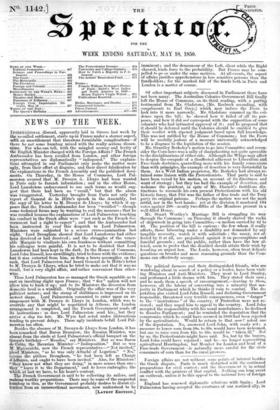NEWS OF THE WEEK.
liTERNATIONAL discord, apparently laid in Greece last week by the so-called settlement, starts up in France under a sterner aspect, -with an unsettlement that threatens formidable complications—if
there be not some humbug mixed with the really serious dissen- sions.For who can tell, with the mingled secrecy and levity of the English Minister charged with the Foreign Affairs? The French
Ambassador has been recalled from London and other foreign representatives are diplomatically "indisposed." The explana-
tions attempted in our Parliament only make the matter more ugly, from their effort at disguise, and their direct falsification by the explanations in the French Assembly and the published docu- ments. On Thursday, in the House of Commons, Lord Pal- merston averred that- M. Drouyn d.. Lbuys had been wanted in Paris only to furnish information ; and in the other House,
Lard Tansdowne endeavoured to use such terms as would sug- gest that there had been no "recall," but that the alarm was exaggerated. Yesterday brought from Paris not only the 'report .of General de la .Hitte's speech in the Assembly, but the copy of his letter to M. Drouyn de Lhuys; by which it ap- pears that the French Ambassador has been recalled "—though some technical forms may be wanting to seal the measure ; that he was recalled because the explanations of Lord Palmerston touching isis conduct in the Greek affair were "not such as the French Go- vernment had a right to expect" ; and that the Ambassador had been instructed to read this despatch to Lord Palmerston. Ministers were subjected to a severe cross-examination last night. 'Lord 'Brougham showed that Lord Lansdowne had either been deceived or had .deceived ; and the struggles of the vener- able Marquis to vindicate his own frankness without committing his colleague were painful. It is not to be doubted that Lord LansclOwne had been kept in the dark. In the House of Commons, Lord John Russell, less unwillingly, tried to fence with the evidence; but-it:Was extorted from -him, as from a brave accomplice on the rack, that I.ord Palinerston had heard General de la Hitte's letter to MAYrouyn de Lhuys' when he tried to make out that it was no recall, but a very slight affair, and rather convenient than other- vrise. ,
Thus Lord Palmerston has so managed the Greek squabble as to east an insulting slight upon France; that " fier " nation will not allow hint to hush it up ; and to its Ministers the diversion from doniestic broil is a windfall. Originally the affair was of the very paltriest nature; and the stamp of shabbiness is impressed on its newest shape. Lord Palmerston consented to enter upon an ar- rangement with M. Drouyn de Lhuys in London, which was to override any that might be negotiated in Athens; the London arrangement is completed, and the French Government sends off its instructions: so does Lord Palmerston send his ;but they arrive a day too late. Mr. Wyse had acted under instructions tending to prevent delays. These ugly incidents befall Lord Pal- merston too often.
Besides the absence of M. Drouyn de Lhuys from London, it has been remarked that Baron Brunnow, the Russian Minister, was absent from the circle at Lord Palmerston's:. official banquet on the Queen's birthday—" Measles," say Ministers. But so was Baron de Cetto, the 'Bavarian Minister—" Indisposition." But so was Marescalchi, now the French representative—" Not invited," plead Ministers, "as he was only Attaché of Legation." "No," rejoins the Pitiless Brougham, "he had been left as Chargé d'Affaires, and ought to have been invited." Alas, for Ministers! "they know not what they are doing," in more senses than one : they "leave it to the Department,' and he loves embroglio; the -Which at last we have, to his heart's content. The French Government is said to be collecting its sailors, and making warlike preparations. There may be some of the suspected humbug in this, as the Government probably desires to divert at- tention-from an insurrectional movement, now understood to be
imminent ; and the demeanour of the Left, silent while the Right cheered, lends force to the probability. But France may be com- pelled to go on under the same motives. At all events, the aspect of affairs justifies apprehensions in less sensitive persons than the fandholders ; for the marked fall of the funds both in Paris and London is a matter of course.


























